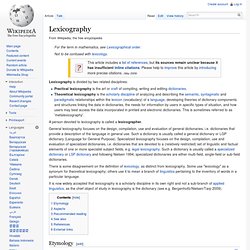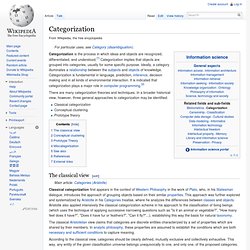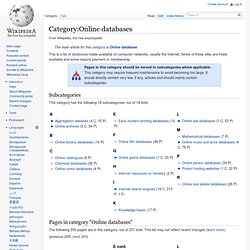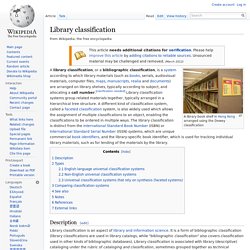

Portal:Contents/Indexes. Lexicography. Lexicography is divided by two related disciplines: A person devoted to lexicography is called a lexicographer.

General lexicography focuses on the design, compilation, use and evaluation of general dictionaries, i.e. dictionaries that provide a description of the language in general use. Such a dictionary is usually called a general dictionary or LGP dictionary (Language for General Purpose). Specialized lexicography focuses on the design, compilation, use and evaluation of specialized dictionaries, i.e. dictionaries that are devoted to a (relatively restricted) set of linguistic and factual elements of one or more specialist subject fields, e.g. legal lexicography. Such a dictionary is usually called a specialized dictionary or LSP dictionary and following Nielsen 1994, specialized dictionaries are either multi-field, single-field or sub-field dictionaries.
There is some disagreement on the definition of lexicology, as distinct from lexicography. Etymology[edit] Portal:Contents/Categories. Category:Portals. See also: List of all portals and Featured portals This category contains Wikipedia portals and pages related to portals.

A portal is a focus page which highlights a particular subject, to complement the main article on that subject. Portals feature articles covering the portal's theme, and generally provide lists of related articles, and thus provide an alternative means to browse on Wikipedia. Categorization. There are many categorization theories and techniques.

In a broader historical view, however, three general approaches to categorization may be identified: Classical categorizationConceptual clusteringPrototype theory The classical view[edit] The classical Aristotelian view claims that categories are discrete entities characterized by a set of properties which are shared by their members. In analytic philosophy, these properties are assumed to establish the conditions which are both necessary and sufficient conditions to capture meaning. According to the classical view, categories should be clearly defined, mutually exclusive and collectively exhaustive. Conceptual clustering[edit] Conceptual clustering developed mainly during the 1980s, as a machine paradigm for unsupervised learning.
Categorization tasks in which category labels are provided to the learner for certain objects are referred to as supervised classification, supervised learning, or concept learning. Portal:Contents/Reference. Category:Reference works. Category:Fundamental categories. A fundamental category in a "tree of all knowledge" denotes a top-level place to start in a system of categorization, as when browsing Wikipedia categories for articles.

This is the top level in terms of encyclopedia article function and content. It is intended to contain all and only the few most fundamental ontological categories which can reasonably be expected to contain every possible Wikipedia article under their category trees. These categories are: physical entities (matter), biological entities (life), social entities (society), and intellectual entities (concepts). An alternative root category, based on a somewhat more detailed initial classification, is Category:Main topic classifications. To begin browsing using Wikipedia's categories, you can also see Wikipedia's portal for Categories. The top level of Wikipedia's overall category system, containing both articles and other Wikipedia project pages, is Category:Contents. Portal:Contents/Outlines. Portal/Directory. Category:Outlines. From Wikipedia, the free encyclopedia This is the parent category for pages in Portal:Contents/Outline of knowledge.

See also: WP:OUTLINE and WikiProject Outlines. Subcategories This category has the following 2 subcategories, out of 2 total. Portal:Contents/Overviews. Category:Knowledge representation. Databases & Linked Data. Category:Online databases. This is a list of databases made available on computer networks, usually the Internet.

Some of these sites are freely available and some require payment or membership. Subcategories This category has the following 18 subcategories, out of 18 total. Directories / LIsts / Annuaires. Portal:Contents/Lists. Search engines. Library catalog. Another view of the SML card catalog The card catalog was a familiar sight to library users for generations[vague], but it has been[when?]

Effectively replaced by the online public access catalog (OPAC). Some still refer to the online catalog as a "card catalog". Some libraries with OPAC access still have card catalogs on site, but these are now strictly a secondary resource and are seldom updated. Many of the libraries that have retained their physical card catalog post a sign advising the last year that the card catalog was updated. Goal[edit] Charles Ammi Cutter made the first explicit statement regarding the objectives of a bibliographic system in his Rules for a Printed Dictionary Catalog in 1876. 1. to enable a person to find a book of which either (Identifying objective) the authorthe titlethe subjectthe category is known. 2. to show what the library has (Collocating objective)
Portal:Library and information science. Search methods, tips & tricks. Category:Library cataloging and classification. Classification schemes. Library classification. A library book shelf in Hong Kong arranged using the Dewey classification Description[edit] Library classification is an aspect of library and information science.

It is a form of bibliographic classification (library classifications are used in library catalogs, while "bibliographic classification" also covers classification used in other kinds of bibliographic databases). Library classification is associated with library (descriptive) cataloging under the rubric of cataloging and classification, sometimes grouped together as technical services. The library professional who engages in the process of cataloging and classifying library materials is called a cataloger or catalog librarian. Library classification of a piece of work consists of two steps. It is important to note that unlike subject heading or thesauri where multiple terms can be assigned to the same work, in library classification systems, each work can only be placed in one class.